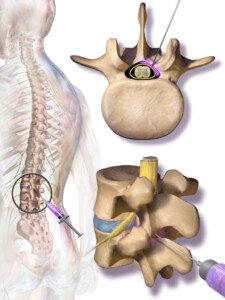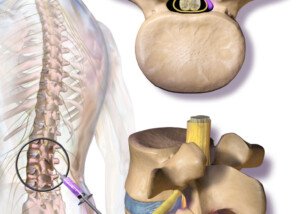
A doctor explains the safety of an epidural injection for the elderly patient including those with heart disease.
You may also be wondering if this procedure is done under general anesthesia (to guarantee the patient won’t move).
“General anesthesia isn’t required for an epidural injection,” says Dr. Michael Perry, MD, member of the North American Spine Society and American College of Sports Medicine.
“Typically, they can be done with local anesthesia. If the patient is very anxious, a light sedation can be used.”
Epidural steroid injections are usually administered to people who have pain from a compressed nerve at the location of their lower spine.
The irritation results in local inflammation. The drug that’s injected calms down this inflammation, thereby reducing pain.

Epidural injection. BruceBlaus/CC
Whether the patient is younger or elderly, these epidural injections typically last around three months, sometimes a little longer. They are quite safe for an older patient, but what about one with heart disease?
Heart Disease in an Elderly Patient
“As it relates to heart disease, as long as the patient is in good medical health or being followed regularly by a doctor, an epidural injection is not very risky,” says Dr. Perry. “The problem comes in if the patient is on blood thinners.
“In this case, if you do an epidural, there is a risk of developing a hematoma (collection of blood), which can cause spinal cord compression and be very dangerous.
“Their doctor should ask if they’re on anti-coagulation/blood thinners before giving an epidural injection. For the most part, age doesn’t matter when it comes to epidural injections. And neither does the patient’s history of CABG.”
If anything is harmful to the aged person, it’s living with the pain that a compressed or “pinched” nerve in the lower back causes. Pain is also not always the only symptom; there may be tingling, numbness and weakness in the leg.
The drug that’s used for an epidural injection is a corticosteroid.










































